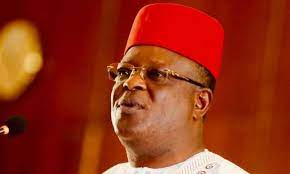In a bold move to tackle Nigeria's infrastructure challenges, the Minister of Works, David Umahi, has terminated several long-standing road contracts nationwide, many of which have been mired in delays for nearly two decades. This shakeup comes as part of his commitment to fast-track road completion and cut through the prolonged bureaucratic red tape that has often stymied progress in the sector.
During a press conference in Abuja, Umahi expressed frustration with the slow pace of certain projects, confirming that over 10 contracts have been terminated according to established due process. While he withheld specifics on which contracts were affected, the minister did emphasize that many of these contracts date back 17 to 20 years, describing the terminations as essential to finally moving forward.
A Closer Look at the Road Contracts in Limbo
The Abuja-Kaduna-Kano highway project, a vital artery in Nigeria's transport infrastructure, was spotlighted. The project, awarded to Julius Berger, has seen significant delays. Umahi issued a seven-day ultimatum for the contractor to resume work, emphasizing that failure to comply would trigger the termination process, with plans to bring in up to three alternative contractors through selective tendering. This no-nonsense approach signals a shift toward demanding accountability and results from contractors, especially on critical projects.
The Financials: A Heavy Price Tag
Umahi outlined the enormity of the work inherited by the current administration: 2,600 existing road projects and an additional 330 supplementary ones. To complete these, the minister estimated an astronomical N19 trillion would be required, a daunting figure given Nigeria's current economic constraints. The Ministry of Works now faces a balancing act of stretching limited resources to achieve maximum impact while ensuring projects adhere to strict deadlines.
Clashes and Calls for Accountability
Hon. Remi Oseni, Chairman of the House Committee on FERMA, publicly criticized Umahi’s handling of road maintenance, even suggesting the minister has failed in his responsibilities. Umahi, undeterred, threw down the gauntlet, inviting Oseni to an open debate to address the criticisms directly. This exchange illustrates the mounting political pressure and scrutiny facing the Ministry of Works as it aims to implement a more aggressive, results-driven strategy.
Implications and the Road Ahead
Umahi’s actions represent a new level of assertiveness in Nigeria’s approach to infrastructure development, focusing on efficiency and accountability. While the termination of contracts may be disruptive in the short term, it could also incentivize contractors to meet deadlines or face similar consequences. The ministry's tough stance could set a new standard, one that demands performance and prioritizes the completion of projects over entrenched interests and longstanding inefficiencies.
Takeaways
- Termination of Stalled Contracts: Over 10 long-delayed road projects terminated to push progress.
- Seven-Day Ultimatum for Julius Berger: High-stakes deadline for the contractor to restart work on the Abuja-Kaduna-Kano highway.
- Financial Challenge: Estimated N19 trillion needed to complete ongoing projects.
- Political Clash: Umahi challenges Hon. Remi Oseni to a public debate to address criticisms of his performance.
Quiz
- What prompted the termination of road contracts nationwide?
- Which major project is Julius Berger responsible for, and what ultimatum did they receive?
- How much funding is estimated to be necessary to complete all ongoing road projects?
- Who criticized Umahi’s performance, and how did Umahi respond?
- What impact could these terminations have on Nigeria’s infrastructure development?
Final Thoughts
With the stakes as high as they are, this could either be the shake-up Nigeria's road infrastructure needs or a test of the Ministry's ability to deliver against such odds. So, let's keep an eye on how this progresses—it's a potential game-changer.
